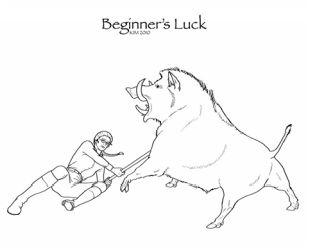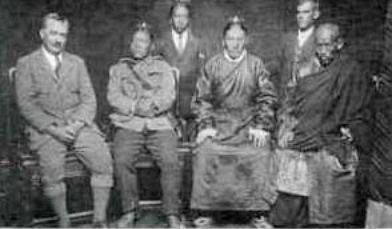The Mary Russell Companion (20 page)
Read The Mary Russell Companion Online
Authors: Laurie R. King
Tags: #Mystery; Thriller & Suspense, #Mystery, #Women Sleuths, #Reference, #Writing; Research & Publishing Guides, #Research

The intruder was neither a neighbour nor a lost and benighted Downs rambler, nor even Patrick come for assistance with an escaped cow or a chimney fire. It was a stranger dressed for Town, a thick-set, clean- shaven, unevenly swarthy figure in an ill-fitting and out-of-date city suit that exuded the odour of mothballs, wearing a stiff collar such as even Holmes no longer used and a rather garish green silk necktie that had been sampled by moth. The hat on his head was an equally ancient bowler, and his right hand was in the process of extending itself to me- not to shake, but openhanded, as a plea. A thin scar travelled up the side of the man’s brown wrist to disappear under the frayed cuff of the shirt, a thin scar that caught at my gaze in a curious fashion.
“You must help me,” the stranger said. For some peculiar reason, my ears added a slight lisp to his pronunciation, which was not actually there.
“I beg your pardon, sir,” I began to say, and then my eyes went back to the darkness on his temple that in the shadowy doorway I had taken for hair oil. “You are hurt!” I exclaimed, then turned to shout over my shoulder, “Holmes!”
“You must come with me,” the man demanded, his command as urgent as the fist on the wood had been. Then to my confusion he added a name I had not heard in nearly five years. “Amir,” he murmured. One shoulder drifted sideways, to prop itself against the door frame.
I stared at him, moving to one side so the interior light might fall more brightly on his features. I knew that face: beardless as it was, its missing front teeth restored, the hair at its sides conventionally trimmed, and framed by an incongruous suit and an impossible hat, it was nonetheless the face of a man with whom I had travelled in close proximity and uneasy intimacy for a number of weeks. I had worked with him, shed blood with him. I was, in fact, responsible for that narrow scar on his wrist.
“Ali?” I said in disbelief. “Ali Hazr?”
His mouth came open as if to speak, but instead he stumbled, as if the door frame had abruptly given way; his right hand fluttered up toward his belt, but before his fingers could reach his waistcoat, his eyes lost their focus, then rolled back in his head, his knees turned to water, and fourteen and a half stone of utterly limp intruder collapsed forward into my arms.
(For more background and a longer excerpt, see this book’s page on the Laurie R. King website.)
The Game

Beginner’s Luck, (Kimberly Pollard)
Russellisms
Where Holmes learnt to arrange a woman’s hair I never knew–never wished to ask–but he was remarkably proficient at it.
**
A sari is not a carefree sort of garment.
**
The pig looked the size of a bear, murderous little eyes over a cluster of curved razors; I half expected the thing to rip out my throat.
All the world’s stage: places Russell goes in this Memoir
England: Sussex, London, Kent, Dover
France: Calais, Paris, Marseilles
Suez Canal; Aden
India: Bombay, Delhi, Simla, Khalka, Khanpur
(See the
Maps chapter
for details, particularly of the princely states of India.)
Laurie’s Remarks
Six brief years after he introduced Sherlock Holmes to the world, Conan Doyle killed him.
His Last Bow
describes how Holmes tumbled into the Reichenbach Falls, sacrificing himself to save the world from the wickedness of Professor Moriarty.

Holmes and Moriarty at Reichenbach Falls
For ten long years, the world mourned, until finally Conan Doyle revealed that Holmes had in fact lived, and returned to London (scaring poor Watson into a faint) in the spring of 1894. During what Sherlockians call “The Great Hiatus” (not ten years, but three, from 1891 to 1894), as Holmes recounts to Watson:
I traveled for two years in Tibet...and amused myself by visiting Lhasa, and spending some days with the head Lama. You may have read of the remarkable explorations of a Norwegian named Sigerson, but I am sure that it never occurred to you that you were receiving news of your friend.

William King with the 13
th
Dalai Lama, 1922 (see Addendum 2)
This was years before Tibet was opened by the Francis Younghusband expedition in 1904. Before then, Westerners were not permitted in the holy city of Lhasa…but Holmes was travelling in disguise.
Imagine the intoxication of freedom, after years of keeping his nose down on the trail of the criminal world. Imagine India after the cold, grey Victorian crowds of London. The smells, the sounds, the texture of life—Holmes would have been swept along the arterial flow of the Grand Trunk Road, that river of humanity flowing across the north of India from Calcutta to Peshawar. On that road, he would have met merchants and thieves, horse dealers and merchants, British soldiers and Bengali babus and… spies.

Grand Trunk Road
Espionage permeates
The Game
as it permeates the north of India—and has since before Rudyard Kipling was born in Bombay. Kipling’s
Kim
, written at the end of the nineteenth century, concerns a half-British lad pulled between joyous native freedom and the satisfactions of living up to one’s duty; torn between his beloved Tibetan red-hat lama and the English spymaster, “Colonel Creighton”, who draws him into the greater world (by way of “survey” work—based on that of Thomas Montgomerie, whose “pundits” paced off distance with their prayer beads).

Thomas Montgomerie and “pundit” Nayin Singh of the Indian Survey
Is it extraordinary to imagine that Holmes’ path might have crossed that of the boy Kim and his lama, on their way to Tibet?
Conan Doyle knew Kipling, and his work. All the same, it does not seem to have occurred to Watson, or Conan Doyle, or indeed to Rudyard Kipling himself, that Sherlock Holmes might have encountered young Kimball O’Hara, Creighton’s apprentice into the Great Game.
Excerpt
"What has happened, Mycroft?" Holmes asked, drawing my attention back to the until-now overlooked fact that, if Mycroft, in his condition, had been consulted on a matter by whichever government, it had to have struck someone as serious indeed.
By way of answer, the big man reached inside the folds of his voluminous silken dressing-gown and pulled out a flat, oilskin-wrapped packet about three inches square. He put it onto the linen cloth and pushed it across the table in our direction. "This came into my hands ten hours ago."
Holmes retrieved the grimy object, turned it over, and began to pick apart the careful tucks. The oilskin had clearly been folded in on itself for some time, but parted easily, revealing a smaller object, a leather packet long permeated by sweat, age, and what appeared to be blood. This seemed to have been sewn shut at least two or three times in its life. The most recent black threads had been cut fairly recently, to judge by their looseness; no doubt that explained the easy parting of the oilskin cover. Holmes continued unfolding the leather.
Inside lay three much-folded documents, so old the edges were worn soft, their outside segments stained dark by long contact with the leather. I screwed up my face in anticipation of catastrophe as Holmes began to unfold the first one, but the seams did not actually part, not completely at any rate. He eased the page open, placing a clean tea-spoon at its head and an unused knife at its foot to keep it flat, and slid it over for me to examine as he set to work on the second.
The stained document before me seemed to be a soldier’s clearance certificate, and although the name, along with most of the words, was almost completely obscured by time and salt, it looked to belong to a K- something O’Meara, or O’Mara. The date was unreadable, and could as easily have been the 1700s as the past century—assuming they issued clearance certificates in the 1700s. I turned without much hope to the second document. This was on parchment, and although it appeared even older than the first and had been refolded no less than four times into different shapes, it had been in the center position inside the leather pouch, and was not as badly stained. It concerned the same soldier, whose last name now appeared to be O’Hara, and represented his original enlistment. I could feel Mycroft’s eyes on me, but I was no more enlightened than I had been by the certificate representing this unknown Irishman’s departure from Her Majesty’s service.
Holmes had the third document unfolded, using the care he might have given a first-century papyrus. He made no attempt to weigh down the edges of this one, merely let the soft, crude paper rest where it would lest it dissolve into a heap of jigsaw squares along the scored folds. I craned my head to see the words; Holmes, however, just glanced at the pages, seeming to lose interest as soon as he had freed them. He sat aside and let me look to my heart’s content.
This was a birth certificate, for a child born in some place called Ferozepore in the year 1875. His father’s name clarified the difficulties of the K-something from the other forms: Kimball.